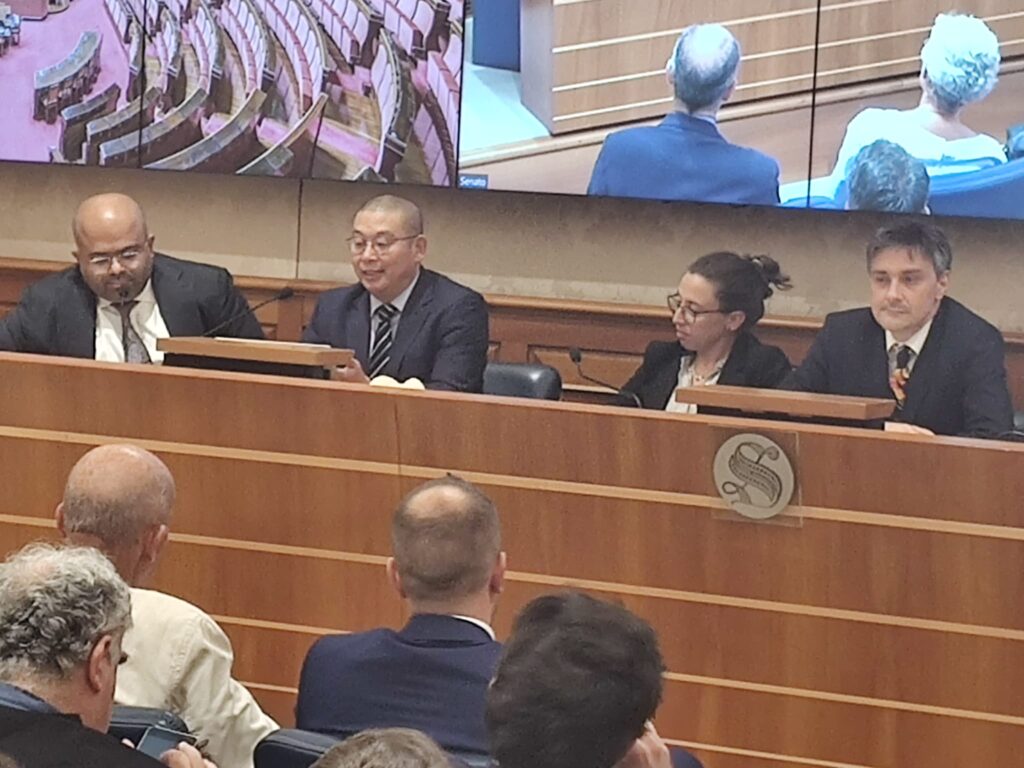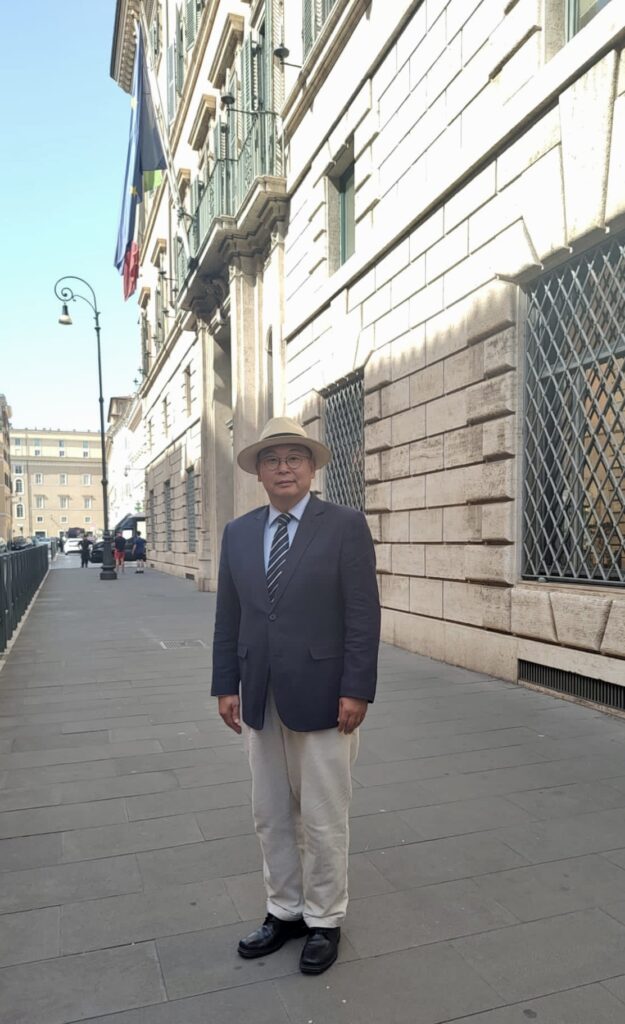A COMPARISON BETWEEN RUSSIAN AND CHINESE APPROACHES
(Initiated by Italian Senator Giuliomaria Terzi di Sant’Agata)
Date: July 19th, Time: 5 pm – 7 pm
Venue: Sala Caduti di Nassirya – Palazzo Madama, Piazza Madama 11, Rome, Italy.

First Round of Remarks
There has been ongoing debate here in Italy on issues related to the MoU on China’s Belt and Road Initiative (BRI) and whether Italy should renew it. I suggest three basic criteria that I would like Italy to follow in making decisions regarding the BRI. These criteria should be accepted by the Italian public and serve as a guideline, not only for BRI-related decisions, but also for Italy’s economic relations with China in general.
First, consideration of economic interests; second, the direct impact on politics, society, and national security; and finally, the long-term risk of putting Italy in a position where it may be unable to uphold democratic values and principles in international affairs.
Considering economic interests is a natural part of doing business. When Italy signed the BRI MoU four years ago, then-Prime Minister Conte hoped to boost the Italian economy and increase Italy’s exports to China. Italy’s current foreign minister, Antonio Tajani, said in an interview last month that Italy has gained little from its participation in China’s BRI.
As for the direct impact on politics, society, and national security beyond the economy, media cooperation, for example, is part of the BRI agreement. Major Italian media outlets, including the Italian Broadcasting Corporation and Italy’s largest private television network, Mediaset Group, have signed content exchange agreements with Chinese official media. This is not a mutually beneficial or reciprocal agreement, as China does not publish any Italian media content, while Italy publishes CCP official media content. CCP content is propaganda, not news, so the agreement raises important ethical concerns and represents a serious erosion of Italy’s free society.
The BRI cooperation agreements between China and Italy also include the development of the Port of Genoa and the Port of Trieste. Genoa and Trieste are Italy’s busiest ports, with Trieste having a strategic location radiating towards Central and Eastern Europe. During the Russia-Ukraine war, when Ukrainian ports were blocked by Russia, Trieste and Venice could serve as logistics hubs. If these strategically important ports fell into the hands of China, it would inevitably threaten Italy’s national security.
The final criterion goes beyond the decision of whether Italy should renew its BRI agreement with China. It is a structural consideration that balances Italy’s economic relations with China, which is defined as a systemic adversary of the European Union, and the preservation of democratic principles.
In recent years, the CCP has become increasingly comfortable using its economic power to coerce and intimidate democratic countries with which it has values-related or ideological conflicts. Values-related conflicts arise over issues such as human rights, Taiwan, and holding China accountable for the pandemic. According to incomplete statistics, since 2010, countries directly affected by China’s economic retaliation over value-based conflicts include Norway, the United Kingdom, France, Mongolia, Japan, Taiwan, Australia, the Czech Republic, Lithuania, and others. In recent years, in the face of China’s economic retaliation, Japan, Taiwan, Australia, the Czech Republic, and Lithuania have engaged in mutual economic assistance models that deserve to be institutionalized. While collective security alliances and trade organizations exist, they cannot address the economic coercion from China that results from values-related conflicts. The economic losses that individuals, companies, or countries are willing or able to bear in order to resist China’s economic bullying are limited. The world’s democracies must come together to respond as one.
I thus advocate for the establishment of a values-based economic “NATO” for democratic countries. The NATO principle of collective defense should be applied to the economic field, which means that if China retaliates economically against a member country of the value-based economic “NATO” for upholding democratic principles, other member countries must collectively provide protection and support to alleviate the economic pressure resulting from such retaliation. This will help overcome the collective action dilemma that democratic countries have faced in the past.
Democracy is a fundamental principle enshrined in the Italian Constitution. Italy and China have a fundamental discrepancy in values, and political conflicts are inevitable. If Italy wants to remain a respected democratic power committed to strengthening democratic values and institutions at home and abroad, it must actively promote the establishment of an economic alliance based on values, starting with the G7, the European Union, and various transatlantic democratic allies. Therefore, the importance of political and economic relations with these democratic partners far outweighs the importance of economic relations with China. If these Western democratic countries view the BRI as a Trojan horse for Beijing’s geopolitical interests, and if renewing the BRI MoU with China will damage Italy’s relations with its transatlantic democratic allies, Italy must make a wise choice. It is not simply a matter of aligning with one of the two superpowers—the United States or China—as many observers have described it, nor is it an attempt to decouple from the Chinese economy. Rather, it is a decision to establish a values-based economic alliance with democratic allies around the world and to engage with China on principled terms that are consistent with Italy’s founding principles, economic security considerations, and long-term economic interests.

Second Round of Remarks
In 2021, The Parliamentary Assembly of Council of Europe passed the resolution “Media freedom, public trust and the people’s right to know”. It is a known fact that all news agencies in China are state-owned propaganda apparatuses which are intended to undermine people’s right to know instead of enhancing it. But media cooperation is part of the BRI agreement between Italy and China, which threatens to violate the principles outlined in the resolution. Item 9 of the resolution, for example, stipulates “The media… must be free from any pressure…”. The Italian media organizations that corporate with the Chinese state-owned press will inevitably be subjected to pressures from the CCP which is so deeply inhabited of controlling the media. Item 10 of the resolution, another example, asserts “Citizens must be aware of who is behind the news and understand the entire ownership structure of media outlets, including beneficial owners, as well as information-sharing agreements between media outlets and other entities.” When major Italian media outlets share contents of CCP propaganda, the Italian people have little clue about what is going on, which contributes to the dire situation described by Item 3 of the resolution “Today, our democratic values and the functioning of our democratic institutions are challenged by post truth narratives, disinformation, narrow agenda-setting powers and recurrent attempts to manipulate public opinion…”.
A report by Italy’s Parliamentary Security Committee (COPASIR) in 2020 revealed that during the COVID-19 pandemic, Italy became the target of Chinese disinformation and conspiracy theories, at one point even being portrayed as the “country of origin” of the virus. In addition, the CCP mobilized the entirety of its “United Front” forces in Italy (including Chinese communities, overseas Chinese student organizations, and Confucius Institutes) to raise funds for the purchase of masks and other medical supplies to support Italian hospitals. Then, using thousands of bot accounts on social media, China engaged in “mask diplomacy” and portrayed it as Italy receiving special treatment for its participation in the BRI. However, the assistance claimed by Chinese media, including large amounts of medical supplies, was co-funded by Italy’s Civil Protection Department and provided through national agencies and foundations.
The Italian parliamentary security committee was right in recommending that in the post-pandemic era, Western democracies must coordinate and take concrete actions to counter Chinese false propaganda in Europe. And for its part, the Parliamentary Assembly’s resolution calls on member States to, among other things, “bring their legislation and practice into line with Parliamentary Assembly Resolution 2065 (2015) “Increasing transparency of media ownership” , to urge member States on media pluralism and transparency of media ownership, in order to fully implement Council of Europe standards concerning transparency of media ownership and financing, and to request full transparency in the conditions and execution of information-sharing agreements that media conclude with third parties.
There have been many talks about China’s influence. It is time to realize that China has no moral authority or any real hard power except money. While money is probably only form of China’s hard power, amorality has become China’s soft power—a pragmatist soft power that that China has adopted and developed out of the Tiananmen Massacre. Its formula can be described as disregard for human rights, contempt for democratic values, plus veneration of money.
China’s pragmatist soft power is appealing to many parts of the world including democratic countries. When negotiating Belt-and-Road deals, the CCP doesn’t care about the human rights abuses, government corruption or lax environmental regulations of the target country. Morally-upright democracies simply cannot compete with China in this regard. Former U.S. official Larry Summers noted what the leader of one developing country told him (paraphrased): “From the U.S., we get a lecture; from China, we get an airport.”
Exercising pragmatist soft power, China recently scored a major diplomatic victory by successfully brokering the Saudi–Iranian détente. Building on this momentum, China, with its pragmatist soft power, now wants to broker an end to the Russian–Ukrainian war on its own self-serving terms.
So far, China’s pragmatist soft power has reaped limited rewards in the world’s developed democracies, despite China’s frequent attempts at economic coercion. Unfortunately, the economic overdependence of virtually every democracy on China makes the liberal world extremely vulnerable to the CCP’s bullying tactics.
To compete with and overcome China’s pragmatist soft power, again I propose a values-based economic “NATO” for the world’s democracies. The values-based economic “NATO” would engage in collective defense of its members to counter China’s economic coercion, place human rights and democratic values at the heart of its soft power promotion in developing countries and support their economic development. Its formula can be loosely described as advancing human rights, promoting democratic values, plus economic strength.
If last year’s White Paper movement–the first nationwide protest since the Tiananmen democracy movement–proved anything, it is that, despite the CCP’s soft and hard power, the Chinese people continue to demand freedom and democracy, and therefore change is possible in China. International democratic forces can support that change by defeating the CCP’s pragmatist soft power in the international arena. For any gains the CCP makes on the global stage will only increase the scale and scope of its authoritarianism, both domestically and abroad.
